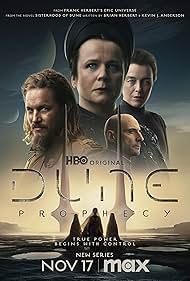Dune: La profecía 2024– 720p.x265 New Episode Torrent
Two Harkonnen sisters battle forces that threaten the future of humanity and form a fabled sect known as the Bene Gesserit. Whether they’re exploring the stars, escaping dystopias, or making the world a better place, these women embody what science fiction is all about. This series draws from Brian Herbert and Kevin J. Anderson’s Great Schools of Dune trilogy. As a prequel to the original Dune, it tells the story of Rosak’s sister becoming a Bene Gesserit. The scene in which Valya Harkonnen uses her voice is from the book Mentats of Dune. All three books link the development of the sisters, Mentats, Navigators, and Brush Doctors. Quoted in AniMat’s Crazy Cartoon Cast: The New Normal (2020). To put it bluntly: the backlash against the perceived “DEI politics” in this series is not only tiresome, but also fundamentally wrong. Anyone familiar with Frank Herbert’s Dune universe knows that women, and especially sisters, have always played a central role in history. This isn’t a modern “rewrite” to appease audiences—it’s hardwired into the DNA of the characters. Complaining about women in power is like criticizing sand for showing up in the desert. If it somehow makes you uncomfortable, you should consider why that might be. That said, let’s focus on the important stuff: the series itself. Visually, it’s stunning. The art direction pays homage to the bold aesthetic of Denis Villeneuve’s films and creates a seamless visual connection to the larger Dune universe. The phone feels ambitious yet intimate, balancing grand, expansive shots with more personal, tightly framed moments. Sure, the CGI techniques sometimes show the budget constraints, but the overall design is so sharp and thoughtful that it doesn’t matter. It’s not perfect, but it’s close enough to the original to be immersive. While the writing style isn’t as philosophically dense as the main Dune saga, it respects the intelligence of its audience. It doesn’t oversimplify or water down the complexity of Herbert’s world to make it suitable for newcomers. Instead, it relies on the power dynamics and political intrigue that make Sisterhood so compelling. It’s an intellectual, slow-burning narrative that rewards attention without ever feeling overly complacent. The last 20 minutes of the first episode in particular deliver a level of tension and impact that captures the spirit of Dune at its best—layered, captivating, and quietly monumental. What sets this series apart is how it uses Sisterhood to explore another dimension of the expansive Dune universe. The political machinations are more to the fore here, offering a fresh perspective on the underlying power dynamics that often drive the larger narrative. It has the feel of early Game of Thrones, but with a distinctly Dune sensibility: less gratuitous, more thoughtful, and deeply engaged with the philosophical questions that define Herbert’s work. The cast is a compelling mix of veteran performers and rising stars, with some standout performances that suggest even greater things are to come. As for the adaptation itself, it’s clear that the creators took great care not to compromise the integrity of Herbert’s vision. This is not a watered-down reimagining, but a serious, ambitious continuation of the world he created. Admittedly, newcomers might find the dense lore and shadowy politics off-putting, but fans of the books or Villeneuve’s films find that part of the appeal. For those already invested in Dune, this series feels like a worthwhile extension—a chance to delve deeper into the nuances of Herbert’s universe. If you’re a beginner, this is a great place to start, although you may have to put in a little more effort to keep up. Trust me, it’s worth the effort.




 29/22
29/22
Seems a little quiet over here
Be the first to comment on this post
Write a response